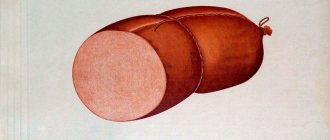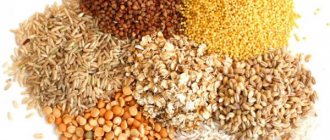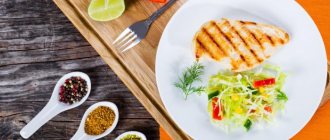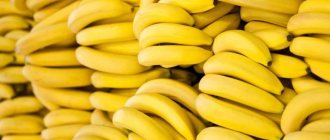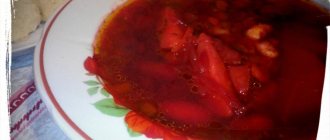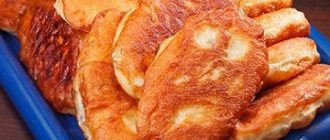When planning a diet, those losing weight are interested in how many calories are in a banana and whether it is possible to gain weight if you eat the fruit daily. Bananas are tasty, healthy and nutritious, and contain almost no fat. Bananas are low in calories - they are a dietary product. However, the main component of the fruit is carbohydrates, so if the diet is planned incorrectly, eating bananas can cause you to gain weight.
How many calories are in a banana?
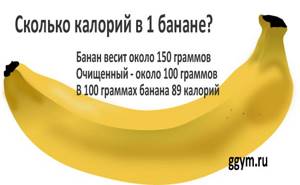
I wonder why the hell you need to know this?
Did you know that you can eat healthy and not count calories at all?
This article outlines the basic knowledge necessary for a person interested in calories, their calculation, consumption, etc.
Most often, people who want to lose weight are interested in calories. If this problem concerns you, there is a lot of useful and instructive information in the article.
Is it possible to eat at night?
It's amazing how a simple question still generates a lot of controversy. Proponents of a healthy diet do not recommend eating anything at all after 18.00. Fans of eating a banana breakfast in the morning claim that it gives them energy. On the other hand, young mothers are happy to give a banana to their babies before bed. This, they say, replaces higher-calorie porridge.
For people suffering from insomnia, the fruit is recommended an hour before going to bed because of its ability to normalize the emotional background and calm the nervous system. Let's leave the final choice to the consumer of this healthy and easily digestible fruit.
What is a calorie?
We rarely think about the meaning of many of the words we use many times a day. Calorie is one of those words. We are accustomed to using it to measure the energy value of food, on which, as we naively think, the amount of our energy and the amount of subcutaneous fat depend.
We are accustomed to thinking that if we start consuming low-calorie foods, we will immediately lose weight and gain athletic figures. Or that if we consume fewer calories than we expend, we will quickly lose weight. Is everything so clear and simple?
Let's look at what the word "calorie" actually means.
The term “calorie” comes from physics and thermal engineering. The Latin word calor means "warmth." The thermal effect of various chemical reactions (release or absorption of heat), physical phenomena (magnetization, dissolution, passage of current, etc.), biological processes (how much heat the body releases at rest or during intense muscular work, etc.) has always been measured in calories. d.).
The amount of calories in a substance is determined using special complex instruments - calorimeters. There are a lot of them, and they have a very diverse structure, depending on the nature of the process being studied.
In relation to food, a simple device called a bomb calorimeter is usually used.
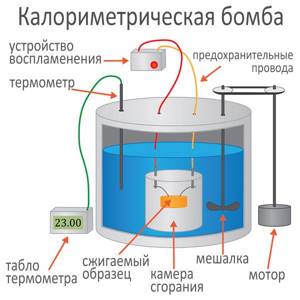
The food is dried and dehydrated and then completely burned. In this case, the released heat heats the environment (usually distilled water). The amount of heat released is determined by the change in water temperature.
This is the calorie content of this product.
One calorie is the heat that warms 1 g of water by one degree Celsius. One kilocalorie is the heat that heats 1 kg of water by 1 degree Celsius.
It was in this simple way that we measured the calorie values of foods and macroelements that are familiar to you: proteins, fats and carbohydrates.
The discrepancy in numbers was not accidental. Different sources give slightly different values.
Proteins – 4.2 – 5.7 kcal/g Fats – 9 – 9.4 kcal/g Carbohydrates – 3.9 – 4.2 kcal/g
And don’t let the “kcal” confuse you. These are kilocalories. Each kilocalorie contains 1000 calories. The nutritional value of foods is measured in kilocalories, since a calorie is a very small unit of measurement for our metabolism.
One kilocalorie (Kcal) = 1000 calories (cal)
Understanding this simple relationship between calories and kilocalories eliminates the mess that comes from reading numerous blogs, forums and superficial newspaper articles.
Calories and food
Almost every product you buy in a store has its calorie content on it. Sometimes it is given in calories, and sometimes in kilojoules.
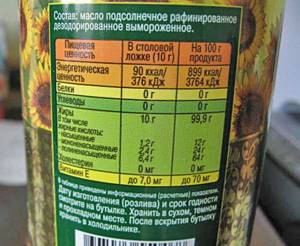
1 KJ = 4.1868 Kcal
Do all the calories indicated on the label necessarily enter our body and turn into heat, fat, work, and other nutrients? Definitely not! And not every calorie from a product immediately becomes fat on your waist!
It all depends on assimilation. Only digestible food matters.
Wood, for example, when burned in a calorimeter bomb, has a fairly high caloric content (think of a fire, stove or fireplace). But if you take and eat half a kilo of sawdust, it’s clear that these calories will not increase our fat reserves in any way. Wood is simply not digestible by our body.
It's about the same story with regular food. Not all substances contained in it are absorbed 100%. Some are not absorbed at all (for example, fiber). Moreover, in different regions of our planet, people have noticeably different digestive capabilities. Asians are better at digesting soy protein than Americans or Europeans. The indigenous people of the North digest fatty foods much better. Etc. Much depends on living conditions and genetics.
Your closest relative may dine on the same set of foods as you, but get a completely different amount of calories, proteins, fats and carbohydrates...
Therefore, the calorie values indicated on the packaging are in fact always lower when it comes to food absorption.
This is the first reason to think about the advisability of “accurate” calorie counting, which is so popular among those who want to lose weight.
Calories and proteins, fats, carbohydrates
Also, we should not forget that calories are energy from nutrients such as proteins, fats, carbohydrates and some other substances (organic acids, alcohols, etc.). Each of these nutrients is used by the body differently. Proteins are used to build and renew muscles, tissues, enzymes, etc. Fats are used as a source of energy and a host of other important functions. Carbohydrates are an important source of energy.
All these substances, which make up calories, do not at all tend to immediately lie down in the form of fat on the sides or thighs.
They are postponed due to your fault, and not on their own. The fault lies in eating too much fat and sweets containing carbohydrates with a high glycemic index (where to put the excess?), in the wrong ratio of different nutrients throughout the day, in muscle weakness and a minimum of physical activity.
The better shape you are, the more calories your body burns even at rest.
Compound
Banana pulp and even peel contain a large amount of nutrients, vitamins and microelements.
Nutrient content table
| Substance | Gy per 100 g of product |
| Squirrels | 1,5 |
| Fats | 0,1 |
| Carbohydrates | 21,8 |
| Water | 74 |
| Starch | 2 |
| Cellulose | 0,8 |
| Ash substances | 0,9 |
| Iron | 0,06 |
| Potassium | 0,284 |
| Calcium | 0,8 |
| Sodium | 0,42 |
| Vitamin B3 | 0,012 |
| Vitamin B5 | 0,04 |
| Vitamin B6 | 0,05 |
| Vitamin C | 0,1 |
| Folic acid | 0,1 |
| Vitamin E | 0,4 |
Human calorie needs
How much energy does a person need to be healthy, have a normal weight and feel great, to have high performance?
To answer this question, you need to know what basal metabolism is.
Basal metabolism is the amount of energy (measured in calories) required to ensure the functioning of the body in a state of complete rest. This is the energy needed simply to be alive and healthy.
For women, this value is approximately 1400 Kcal per day. For men, about 1600 Kcal per day. This is the energy that you spend in any case, and it doesn’t matter whether you play sports, sleep, eat or read a book. These calories are simply needed to keep your body alive.
If a person lives on a poorer diet, he is in a state of hunger with all the ensuing consequences - impaired immunity, weakness, cold extremities, disturbances in nervous activity, hallucinations, increased suggestibility, weakened critical thinking, decreased speed of thought processes, memory impairment, distortion of emotional life , increased levels of stress hormones (cortisol, for example), etc.
A person becomes physiologically and psychologically vulnerable in this state, however, the most basic functions responsible for the survival of the body as a whole are exacerbated. And, believe me, this is not the ability to play the violin! Metabolic processes also slow down significantly (metabolism, metabolism, which we will talk about below), leading to difficulties when trying to influence your figure.
But, as you understand, human life is not limited to maintaining the basic functions of the body. This is LIFE! There are a lot of other things to do in it :)
Therefore, it is necessary to add energy to the basal metabolism for normal physical and intellectual activity.
This table will help you understand approximately how many calories a person needs per day (OO is basal metabolism):
| amount of physical activity | daily energy consumption |
| occasional exercise or minimal physical activity | OO x 1.2 |
| light workouts (1-3 times a week) | OO x 1.275 |
| medium workouts (3-5 times a week) | OO x 1.55 |
| serious training (6-7 times a week) | OO x 1.725 |
| heavy physical work or training 2 times a day | OO x 1.9 |
Women need to substitute 1400 for OO, and 1600 for men.
Then for a woman who does light training 1-3 times a week, the daily calorie intake should be about 1400 x 1.275 = 1785 Kcal. This is the caloric intake needed to maintain your current weight and body composition.
For a man working out in the gym according to a standard program 3 times a week, about 1600 x 1.55 = 2480 Kcal is enough.
More accurate daily calorie values can be obtained on this page How many calories do you need per day
A skeptical reader, who, of course, is an ardent vegetarian or a follower of any Eastern teaching about energies, should remember that the proposed values of the basic metabolism are not taken out of thin air, but have a strict scientific basis. They are determined by direct and indirect calorimetry methods. If you wish, you can understand these fairly simple methods and verify their validity.
Well, we’ve sorted out the calorie needs to maintain current weight. But what about those who want to lose weight? Or with someone who wants to gain weight? If with the latter everything is clear - you just need to increase the calorie content, which is not difficult, then with the former it is more and more difficult.
Banana sorbet
A very light, refreshing dessert perfect for those watching their weight.
Composition of ingredients
To prepare banana sorbet you will need the following set of products:
- 4 ripe bananas;
- 1-2 lemons;
- 6 tbsp. l. powdered sugar, but the amount can be reduced to taste.
Step-by-step cooking process
To prepare banana sorbet you will need:
- Peel the bananas.
- Squeeze the juice from the lemons and remove the zest using a fine grater.
- Mix bananas with lemon juice in a blender, add powdered sugar and zest to taste.
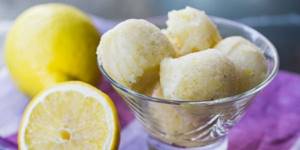
- Beat the whole mass to a light airy consistency.
- Divide the mixture into molds and place in the freezer for at least 4 hours.
What can I add?
Instead of powdered sugar, you can use honey or any other natural sweetener. If you use cream instead of lemon juice, you get very tasty banana ice cream that can be eaten with any berries. For vegans, this recipe uses almond milk.
How to serve a dish
Garnish the sorbet with a mint leaf. You can pour melted dark chocolate over the dessert.
Calories and excess weight
There is an opinion that to lose weight you need to reduce your calorie intake to a minimum. Up to 800-1000 Kcal per day. Seems logical. Spend more than you get and everything will be fine!
But what about the fact that:
1. A person cannot eat like this for the rest of his life. And as soon as he returns to normal nutrition, he will instantly gain weight to an even greater value. The compensatory mechanism of human survival will definitely work. This is a genetic program formed by thousands of generations of our ancestors, which allowed us to survive as a species.
2. A person on such a diet literally leads a vegetable existence (a vegetable, in a word). There can be no talk of any joy from life, or any joy of movement. Not about any health, as you understand, either. Too lazy to move. Too lazy to think. Only the arrows of the scales are on my mind. Motivation and energy from outside are constantly required, since there is always a lack of one’s own. (It’s scary that this is exactly what many people take for a healthy lifestyle, and therefore they fear it like fire).
3. On such a diet (800-1000 Kcal per day) it is impossible to provide all the necessary nutritional needs of the body.
4. Metabolism slows down catastrophically. This means that there will definitely be places on the body with fat that simply cannot be removed, no matter what you do. And all due to a decrease in the activity of some hormones responsible for the body’s energy (thyroid hormones and others).
5. When trying to lose weight on very low-calorie diets, two extremely unpleasant things are observed (the famous Dukan diet is also guilty of this):
– muscle mass is catastrophically reduced, without which normal health and normal metabolism are generally impossible. Instead of beautiful elastic harmony, you get a flabby skeleton with folds.
– there is a nasty sagging of the skin in places where there was fat (this sagging is very difficult to eliminate, the only way is to get better again).
6. With a “hunger” diet, there is an insane craving for sweets (sweets, chocolate, cakes, etc.).
It cannot be overcome! Carbohydrates and fats are normal sources of energy. And your body will not give you a single chance to resist the seductive smells and appearance of these things! Some “sufferers” find themselves at night at the refrigerator, greedily eating various tasty treats!
I think there is enough passion.
What to do? Read on! You need to form a complete understanding of the subject. Then you will understand what the right way out is. There is only one, by the way.
Beneficial features
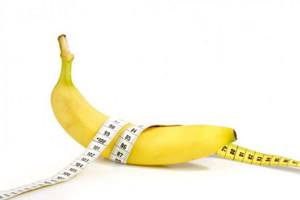
Bananas are good not only for weight loss, but also for overall health. This tropical fruit is capable of:
- improve the functioning of the gallbladder and liver; cleanse the skin of acne;
- increase hemoglobin in the blood, normalize cholesterol, stabilize blood pressure;
- eliminate heartburn and constipation;
- stimulate brain activity, increase concentration (so that mental stress is not a contraindication for such beneficial weight loss);
- help you wean yourself from bad habits - alcohol and tobacco;
- fight insomnia, improve sleep quality;
- participate in the restoration of muscle tissue;
- thanks to the increased potassium content, it strengthens the heart;
- have antibacterial properties.
In addition to all this, banana weight loss will not be accompanied by vitamin deficiency as they provide the body with all the essential nutrients.
The nutritional value:
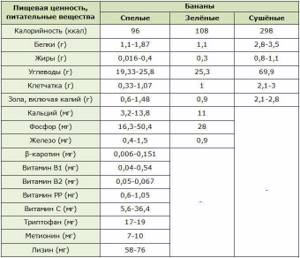
How are calories counted?
What do you think of the following statement?
Even the most accurate calculations and weighing of products give an error of 25% when calculating calories.
Here are some explanations why this is so.
1. Recent research in the US has shown that manufacturers are deliberately lowering calorie values on many products to increase demand. I have no doubt that in Russia this is even worse, given the level of corruption.
2. The calorie content of the same product may vary significantly from one manufacturer to another. Much depends on the raw materials, processing and preparation technology. But on the packaging everything is always the same. Sometimes the answer to the question of how many calories are in a banana greatly depends on the place of its production and storage method.
3. Let's take an ordinary egg as an example. If you have ever eaten normal village eggs, after which you feel crazy full for half a day, you understand how such eggs differ from ordinary store-bought ones. It is very difficult to adequately assess the true nutritional value of a wide range of foods using standard tables.
4. Errors in weighing, the effect of product humidity on the concentration of nutrients, method of preparation - all this deprives all calculations of proper accuracy.
5. In addition, when counting calories, they almost always forget that not only proteins, fats and carbohydrates have calories. Carboxylic acids (organic acids in food), polyhydric alcohols (found in sweeteners, for example, sorbitol, glycerin), and ethyl alcohol (the basis of alcoholic beverages) also have noticeable energy value.
Do you still believe that you can just take it and count how many calories you took in from food per day?
Then at least take into account this 25% error.
Calculating calorie consumption during training causes no less controversy and doubt.
Many visitors to gyms with expensive cardio equipment really believe that they “burned” 350-500 or even more kilocalories in half an hour. Moreover, they are sure that these calories come from their fat tissue.
Calorie consumption at different loads and How many kilocalories should be spent in 1 hour
After this, many people run to the scales and are pleased to note that today they “lost” 1-2 kg during the workout.
But what about these facts?
1. Turn on the cardio machine for half an hour. And take a walk nearby. After half an hour, the simulator will show that you have burned 350 kilocalories! But you weren’t even on this simulator!
2. For some reason, the kilograms lost during training are fully returned the next day. Does this mean that you first lost 2 kg of fat and then gained it back?
The explanation for situation number 1 is that manufacturers of exercise equipment use average calculations using formulas to calculate supposedly burned calories. These formulas are entered into the “on-board computer” of the simulator. And it obediently dispenses calories in accordance with the distance traveled and the level of load.
The explanation for the second situation is even simpler. Weight is lost during training due to water loss through sweat. This is water! Not fat. After the lesson, you drink, eat, and normal water levels are quickly restored. That's the whole secret to losing weight quickly! The same effect is used by the creators of carbohydrate-free diets and diuretics for weight loss (teas, coffee, etc.). They quickly and effectively remove water from the body. This is especially unfortunate since water is taken mainly from muscles (they are 80% water).
Tables of calories and dietary supplements
I will not dissuade you from using KBZHU tables (calories, proteins, fats, carbohydrates) or mobile applications that help you estimate the calorie content of food.
Counter of proteins, fats, carbohydrates and calorie content of foods
If you like it, please! If this brings real results in the form of a slimmer waist, thicker muscles, and more beautiful body shapes, that’s great. Especially if the counting process itself is interesting and enjoyable for you...
Brrrr!
Do you really know people who like to weigh every gram of their lunch and spend a long time calculating calories on a calculator? I know thousands of people. There is not a single one of them!
And everyone who went through this nightmare shouts with one voice that “to hell with it!” It is significant that more than 90% of them were unable to maintain their weight that had begun to fall. The key word here is disruption.
A modern busy person cannot, and should not, spend a lot of energy and time on this arithmetic. Even professional nutritionists find this work extremely tedious. And, again, no one wants to do this for the rest of their life.
Count calories for the rest of your life! A!!!
Habit and ease are what our daily actions consist of. This is the main content of our life - what we do every day, without thinking and with pleasure.
Therefore, I see the most reasonable way to organize your lifestyle and diet, which is easy to make habitual and enjoyable, bringing long-term dividends. And there is hardly a place for kitchen scales and KBZHU tables, you must agree.
Just imagine your day. A well-functioning healthy and convenient system: woke up, washed, did a pleasant morning exercise, had a proper breakfast (following simple and convenient principles), and got down to business. I had several snacks throughout the day (following the same simple and convenient principles). I finished my work day, had a proper dinner (according to the same correct and simple principles), and did some household chores. Fell asleep. And you don’t have to count how many calories are in a banana...
Start building your own convenient and enjoyable system that will work for you every day with almost no effort!
How? Is there a way out?
Definitely! And it is simpler and closer than you think. Below I give tips on how to spend calories correctly and how to get them correctly.
How to spend calories correctly?
The human body is designed smartly. Any significant waste of energy is quickly stopped, as the body considers this a direct threat to life. Therefore, as soon as you “burned” 300-500 kilocalories during training, the body begins to react violently, trying to defend itself. It sends you signals: fatigue, irritability, lethargy, drowsiness, etc. It protects you from unnecessary and completely unnecessary waste of precious vital energy.
You need to spend calories wisely, and for the most part not during training.
Remember these rules for burning calories
Don't try to burn as many calories as possible during your workout.
The training should load as much muscle volume as possible, force the muscles to do as much work as possible per unit of time. This is called intensity. And it is intensity that accelerates metabolism. Strength training and some types of cardio are ideal for this rule.
However, you must understand that many years without normal load have not passed without a trace. You can’t just go and start training like experienced athletes. You need to go through a period of getting into training to prepare your heart, joints, and nervous system for normal stress. If you try to give yourself this level of stress right away, you can cause irreparable harm to your health. Remember, you need to enter training smoothly.
It takes a completely unathletic person about two months to tone his muscles, get his heart in working condition, and activate his metabolism. After this introductory course, you can begin active intensive training. Which, by the way, after the introductory course become very pleasant and desirable. And this doesn't surprise me. After all, our body loves to move and make efforts. True, we don’t always remember this.
And there is no need to try to compensate for your poor diet with excessive exercise. It's useless and very tedious. I often encounter the overzealousness of some people in training. They, as the survey showed, thus try to compensate for their incorrect diet with loads, which they are too lazy to work on. But this is a dead end. Training always works in close connection with nutrition. If you don't normalize your diet, training is almost useless.
Think not about the calories burned, but about the acceleration of metabolism
Metabolism is accelerated by simple things: frequent meals (at least 4 times a day), sufficient caloric content of food (a minimum of calories significantly slows down metabolism), a sufficient amount of clean water every day (at least 1.5 liters), increasing the strength and endurance of your muscles ( muscle is the best calorie burner even at rest; the more muscle, the easier it is to lose fat).
If you are significantly overweight (20 kg or more), walk for 1-2 hours every day
Gradually increase the duration of your walks and your walking speed.
Don't go on diets, just eat normally according to healthy principles
Establish a balanced diet. Determine the list of the right products, discard everything unnecessary. Provide normal, not minimal, calories.
The funny thing is that as soon as your body begins to receive truly useful elements and calories in the right quantities, this inexorable craving for fatty, sweet, etc. will disappear somewhere. And the weight will really start to come off. And the question of how many calories are in a banana will no longer worry you. Checked!
How many calories are in a banana... Hm... How to do without counting calories?
Use a simple and very effective portion size plan. Today you can start eating the right foods in the right proportions.
An easy way to eat healthy without counting calories
Are you trying to gain weight? Lose weight? Just want to eat healthy to stay healthy and maintain a healthy weight?
Then you should definitely think about the correct size and appropriate composition of portions.
As mentioned above, banal calculation of calories is a very tedious and almost hopeless method. It is completely impractical, tedious, and just infuriating! And studies show that its accuracy, even with the most careful weighing of products, does not exceed 25%. That is, you may believe that you are eating 1500 calories, but in fact you will consume 1800 or, on the contrary, 1200. And you won’t even know about it!
Therefore, there is a long-proven way to control calories and portion sizes without counting calories at all.
I offer you one of the ways (there are many) of forming the correct serving size.
Harm to health
Exceeding the norm of consumption of the product can provoke such consequences as:
- allergic reaction;
- a sharp increase in blood sugar levels;
- heartburn;
- weight gain;
- increased gas formation;
- bowel disorder.
Unripe fruits may contain harmful compounds that can cause acute intoxication of the body. Adverse reactions such as bloating, diarrhea, nausea, vomiting are explained by the fact that bananas contain starch. The level of the latter, and therefore the harm to the fruit, varies depending on the stage of ripening:
- Green banana contains a large amount of a substance that provokes fermentation in the intestines.
- When the fruit reaches ripeness, starch is converted into sugar and does not pose a danger to the body.
- Overripe fruit contains a small amount of starch.

